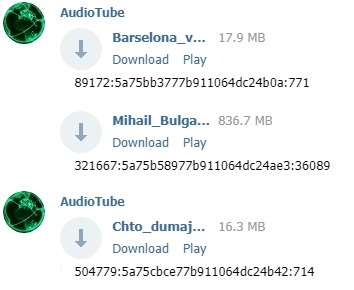Telegram bots. Uploading files larger than 50mb
- Tutorial

Telegram bots allow you to automate many processes. Their use is not limited to one chat, in fact - a bot is just an input-output interface , which, in addition to text , can also receive and transfer files : images, video, audio, documents ...
- For users, the maximum file size is 1.5GB
- Bots are limited to only 50mb in size
How to get around this restriction - under the cut.
Telegram API
Since users can upload files up to 1.5GB - that means we can - for this we will create an agent (named so as not to be confused with bots) that will work in conjunction with our Telegram bot. This will require a separate account and Telegram API.
First, go to https://core.telegram.org and follow the instructions to register the application, in the end you should get api_id and api_hash

What does an agent do?
The bot cannot upload files larger than 50mb, but if it has the file_id of a file already uploaded to the Telegram server, then it can send it. So the algorithm is as follows
- An application running on the server through the Bot API generates a file for sending
- Calls an agent to upload a file to the Telegram server
- Gets file_id from agent
- Uses a downloaded file
Code example
The need to download large files appeared when writing @AudioTubeBot - initially the audio file was divided into parts and sent in parts. The functionality of downloading large files, it was decided to put in a separate application, which is called through subprocess.check_call
#!/usr/bin/env python3
# -*- coding: utf-8 -*-
from telethon import TelegramClient
from telethon.tl.types import DocumentAttributeAudio
import mimetypes
entity = 'AudioTube_bot' #имя сессии - все равно какое
api_id = 1959
api_hash = '88b68d6da53fe68c1c3541bbefc'
phone = '+79620181488'
client = TelegramClient(entity, api_id, api_hash, update_workers=None, spawn_read_thread=False)
client.connect()
if not client.is_user_authorized():
# client.send_code_request(phone) #при первом запуске - раскомментить, после авторизации для избежания FloodWait советую закомментить
client.sign_in(phone, input('Enter code: '))
client.start()
def main(argv):
file_path = argv[1]
file_name = argv[2]
chat_id = argv[3]
object_id = argv[4]
bot_name = argv[5]
duration = argv[6]
mimetypes.add_type('audio/aac','.aac')
mimetypes.add_type('audio/ogg','.ogg')
msg = client.send_file(
str(bot_name),
file_path,
caption=str(chat_id + ':' + object_id + ':' + duration),
file_name=str(file_name),
use_cache=False,
part_size_kb=512,
attributes=[DocumentAttributeAudio(
int(duration),
voice=None,
title=file_name[:-4],
performer='')]
)
client.disconnect()
return 0
if __name__ == '__main__':
import sys
main(sys.argv[0:])
Comments:
That's the whole code - the Telethon library is used here - at startup the program receives the path to the file to send, the file name, chat_id - who the file is for), the name of the bot that called the agent (for example, I have beta and release bots).
client.send_file
Just uploading the file to the server via upload , getting file_id and passing it to the bot will not work, file_id only works inside the chat in which it was created - so that our bot can send the file to the user by file_id - the agent must send him this file
- then the bot will receive own file_id for this file and will be able to dispose of it.
caption = str (...) - wat ?!
The agent sends files only to the bot, adding a comment to caption - I have this:
- end user chat_id
- track duration
- object_id in the database to which file_id needs to be bound so as not to reload the file (indexing, optimization and all that)

Example call in bot code
A file has already been saved on path_file_mp3 for loading, we call the subroutine and wait for it to complete.
the code
status = subprocess.check_call(
"python3.6 audiotubeagent36/main.py " +
path_file_mp3 + ' ' +
audio_title + '.'+ us_audio_codec +
' ' + str(chat_id) +
' ' + str(pool_object['_id']) +
' ' + config.BOT_NAME +
' ' + str(duration),shell=True)
In the inbox, do something like this.
the code
if message.content_type in ['document','audio']:
user_id = message.from_user.id
bot_settings = SafeConfigParser()
bot_settings.read(config.PATH_SETTINGS_FILE)
c_type = message.content_type
if functions.check_is_admin(bot_settings, user_id):
if c_type == 'audio':
file_id = message.audio.file_id
audio_title = message.audio.title
else:
file_id = message.document.file_id
audio_title = message.document.file_name[:-4]
client_chat_id = message.caption
if client_chat_id.find(u':') != -1:
client_chat_id, q_pool_obj_id, duration_s = re.split(r':',client_chat_id)
#добавляем file_id в базу
q_pool.update_request_file_id(str(q_pool_obj_id), str(file_id))
#пересылаем конечному адресату
bot.send_audio(int(client_chat_id),
file_id,caption='',
duration=int(duration_s),
title=audio_title,
performer='')
return
Questions / suggestions write in the comments or chat .
